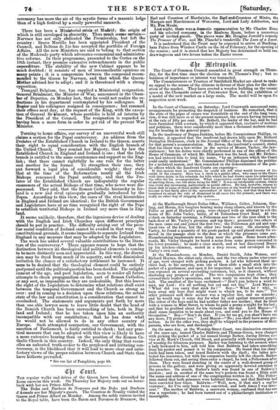Turning to home affairs, our survey of an uneventful week
still claims a section for the Papal controversy. An address from the Prelates of the Established Church in Ireland to the Queen, asserts their right to equal consideration with the English branch of the United Church. They remind her Majesty, that by law the Vetablished Church in England and Ireland is one ; that the Irish branch is entitled to the same countenance and support as the Eng- lish; that there cannot rightfully be one rule for the latter and another for the former. To strengthen their case, they put forward a legal plea of considerable weight : they state that at the time of the Reformation nearly all the Irish Bishops renounced the Papal authority, and that the Pre- lates of the Established Church are indisputably the regular successors of the actual Bishops of that time, who never were dis- possessed. They add, that the Roman Catholic hierarchy in Ire- land is a new and rival episcopate gradually introduced by the Popes. According to this view, the cases of the rival hierarchies in England and Ireland are identical; for the British Government and Legislature have at no time recognized the right of the Pope to establish territorial Bishops in Ireland any more than in Eng- land.
It seems unlikely, therefore, that the ingenious device of dealing with the English and Irish Churches upon different principles should be put in practice. The difficulty arising out of the pecu- liar social condition of Ireland cannot be evaded in that way. On constitutional grounds, it seems impossible to separate Ireland from England in any measure that may be adopted by the Legislature.
The week has added several valuable contributions to the litera- ture of the controversy.* There appears reason to hope that the distinction between its theological and political elements is corning to be more distinctly seen and appreciated. In this way, the discus- sion may be freed from much of its asperity, and with diminished irritation the chance of a satisfactory settlement be increased. It were to be desired that the theological element could be entirely postponed until the political question has been decided. The enlight- enment of the age, and past legislation, seem to render all future attempts to cheek propagandism on the part of Roman Catholics, or any sect, as impossible as they are undesirable. But this leaves the right of the Legislature to determine what relations shall exist between the temporal Government and the Church as strong as ever: and in coming to a decision upon these relations, the actual state of the law and constitution is a consideration that cannot be overlooked. The statements and arguments put forth by more than one able lawyer seem to leave little doubt that the head of the Romish Church has been encroaching of late, both in Eng- land and Ireland ; that he has taken upon him an authority incompatible with our constitution ; that he has done what he would not be allowed to do in any other country of Europe. Such attempted usurpation, our Government, with the sanction of Parliament, is fairly entitled to cheek; but any prac- tical measure that can be adopted with this view is likely to have a more extensive bearing than on the position of the Roman Ca- tholic Church in this country. Indeed, the only thing that recon- ciles an unheated truth-seeker to the perplexed and irritating con- troversy, is the likelihood that it will lead to more clear and antis- factory views of the proper relation between Church and State than have lutherto prevailed.
41 See our list of Pamphlets, page 89.


























 Previous page
Previous page